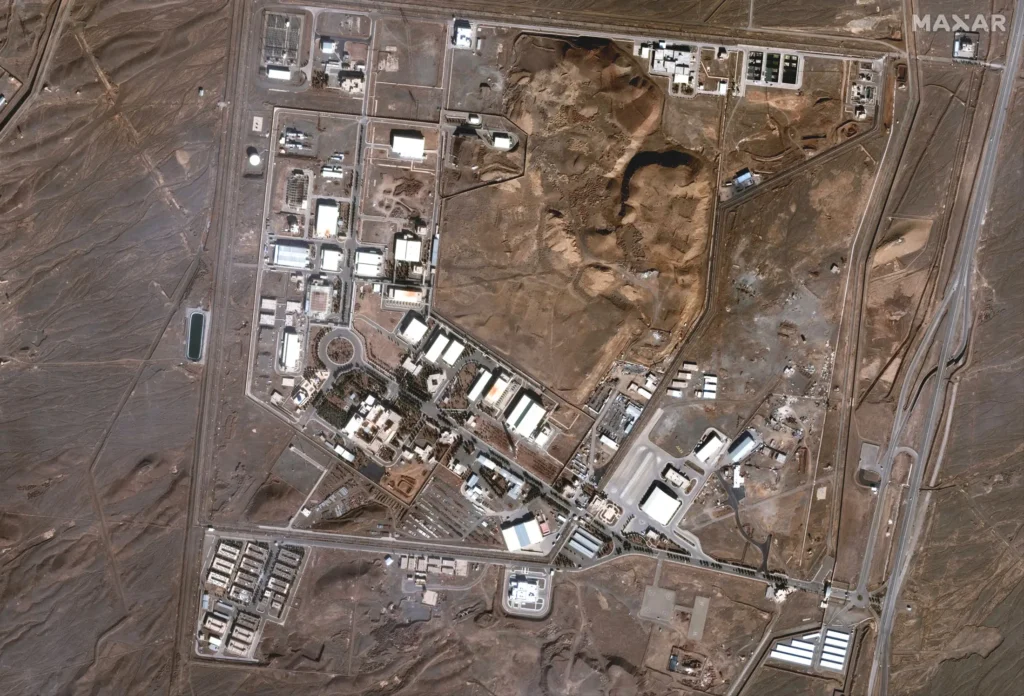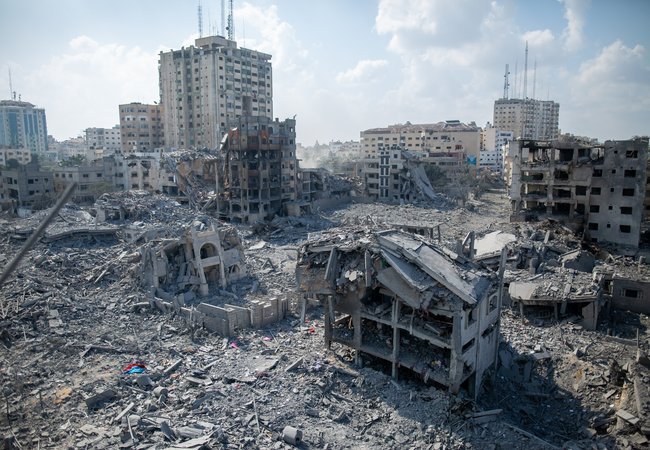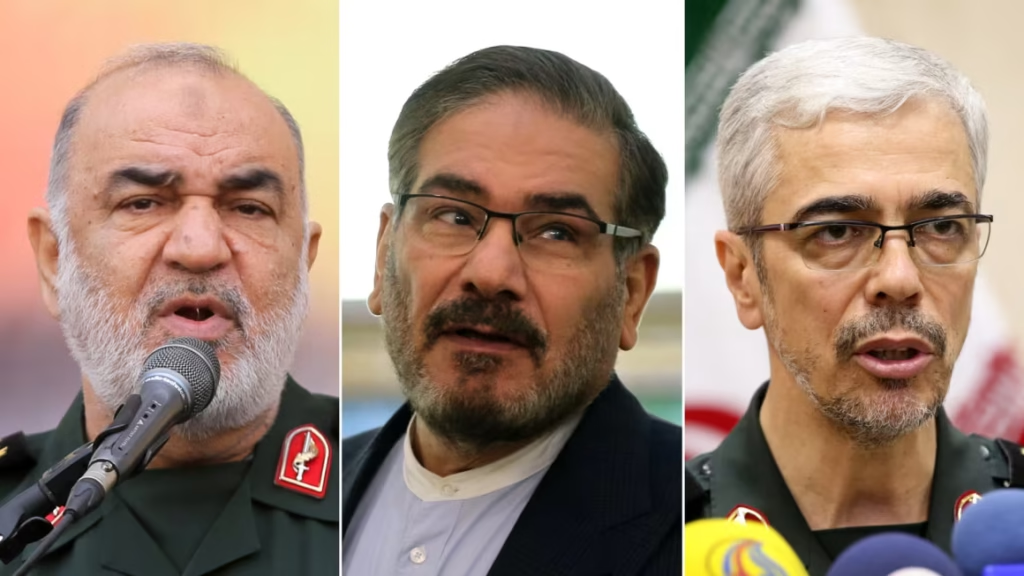Israel Recklessly Gambles Everything on “Operation Rising Lion” ” and the World Holds Its Breath
From Gaza’s devastation to nuclear brinkmanship, Israel’s increasingly isolated government has chosen military escalation over diplomatic restraint, bringing the world a step closer to the abyss.
What does it take to stop a man with nothing left to lose? Benjamin Netanyahu, Israel’s embattled prime minister, has just answered that question with airstrikes, assassinations, and a gamble that could set the Middle East ablaze. In the dead of night, 200 Israeli jets and covert drones struck deep into Iran, targeting nuclear facilities, air defences, and most provocatively, senior commanders of the Islamic Revolutionary Guard Corps.
Among the dead is IRGC chief Hossein Salami, a figure as symbolic as he was powerful. Tehran claims six nuclear scientists were also killed, along with civilians, including children. If verified, this represents not just escalation but an act of war launched by a government already facing international condemnation for its conduct in Gaza.
Israel insists it had no choice, that Iran was sprinting toward a nuclear bomb, and this was the last chance to stop it. But the timing reeks of desperation, not strategy. Netanyahu, facing corruption charges and plummeting domestic support after Gaza’s devastation, needs a crisis to survive politically. What better way to unite a fractured nation than to paint Iran as an existential threat requiring immediate military action?
What better way than to cross the Rubicon and plunge an entire region into war…
Iranian President Masoud Pezeshkian has vowed a “powerful and legitimate” response to Israel’s attacks on the country.
In a speech to the public following the strikes, Pezeshkian said that Iran’s retaliation will “make Israel regret its foolish act”.
He further urged Iranians to trust their leadership and stand with them.
The Pariah State’s Playbook

This latest escalation follows a depressingly familiar pattern. Faced with mounting international isolation over Gaza, Israel has chosen to double down on military solutions rather than engage with diplomatic alternatives. The same government that has ignored international court orders, defied UN resolutions, and dismissed global calls for restraint has now unilaterally launched strikes that could trigger regional war.
The Israeli public, already traumatised by months of conflict, has descended into panic-buying frenzy, clearing supermarket shelves as if preparing for siege. Yes, it’s ironic to even use that word when talking of Israel. This is the domestic backdrop against which Netanyahu operates a population that has been conditioned to view perpetual conflict as normal and military action as the only viable response to complex geopolitical challenges.
But this is not just about Netanyahu’s political survival. It represents the dangerous endgame of a state that has systematically chosen force over diplomacy, isolation over integration, and unilateral action over international cooperation.
The Myth of the Decisive Strike

Israel operates under the doctrine of pre-emption, not deterrence. The 1981 strike on Iraq’s Osirak reactor and the 2007 bombing of Syria’s Al-Kibar facility are held up as tactical successes. But history reveals a darker strategic reality: military strikes often accelerate the very programs they’re designed to stop.
After Osirak, Saddam Hussein accelerated his nuclear program in secret, moving it underground and making it more difficult to detect. Today, Iran’s hardliners, now humiliated and vengeful, will make the same argument they’ve made for years: only a nuclear weapon guarantees survival against Israeli aggression.
The lesson is not lost on other powers. North Korea’s Kim Jong Un understands that nuclear weapons provide immunity from regime change. Libya’s Muammar Gaddafi, who abandoned his weapons program in 2003 only to be overthrown eight years later, learned this lesson too late. Iran’s leaders will not repeat Gaddafi’s mistake.
Trump’s Diplomatic Nightmare
President Trump finds himself in an impossible position. His administration had been preparing for nuclear talks with Iran scheduled for Sunday, hoping to build on his self-proclaimed dealmaking abilities. Instead, his closest ally has just bombed the very country he was hoping to bring to the negotiating table.
Trump’s careful diplomatic language, stressing that Israel acted “unilaterally” and that the US “was not involved”, cannot disguise the fundamental reality: Netanyahu has sabotaged American diplomacy and forced Trump into a crisis he desperately wanted to avoid.
This represents the breakdown of alliance management. When allies can unilaterally launch operations that threaten global stability, the concept of coordinated Western foreign policy becomes meaningless. Netanyahu has essentially presented Trump with a fait accompli: support Israel’s actions or watch the “special relationship” crumble.
However, Secretary of State Marco Rubio’s statement—“Iran should not target U.S. interests”—sounds less like a warning and more like an invitation. If Iran retaliates against American forces, will the U.S. be dragged into war?
The Gaza Connection

Netanyahu’s decision to strike Iran cannot be separated from his government’s conduct in Gaza. Facing international condemnation, potential war crimes investigations, and growing isolation from traditional allies, Netanyahu needed a new crisis to redirect attention and rally domestic support.
The same military-first mentality that has characterised Israel’s approach to Gaza, prioritising immediate tactical gains over long-term strategic consequences, now shapes its approach to Iran. Both conflicts reflect a government that has abandoned any pretence of proportionality or concern for civilian casualties in pursuit of political objectives.
International observers note the pattern: when facing accountability for previous actions, Netanyahu’s government escalates to new conflicts rather than engaging with diplomatic solutions. This is the behaviour of a state that has lost faith in international institutions and legal frameworks.
Global Implications of Rogue Action
Israel’s unilateral strike sets dangerous precedents for international order. If states can pre-emptively attack others based on intelligence assessments about future threats, the entire framework of international law becomes meaningless. China could justify action against Taiwan, Russia could rationalise strikes on Ukraine’s remaining infrastructure, and any regional power could claim pre-emptive self-defence.
The timing is particularly destabilising. With Ukraine still under attack, tensions rising in the South China Sea, and global institutions already strained, the world cannot afford another major conflict. Yet Netanyahu has chosen to light this fuse anyway, gambling that Israel’s actions won’t trigger the regional war that every serious analyst has warned against.
Iran’s Impossible Choice

Iran now confronts a calculation that Israel has deliberately made impossible. Accept the systematic assassinations of over 20 senior commanders, including Major General Hossein Salami and IRGC Aerospace Force Commander Amir Ali Hajizadeh and signal to the world that its nuclear program and military leadership can be slaughtered with impunity, or retaliate in ways that justify the very regional war Netanyahu desperately needs for his political survival.
This is not strategy, it’s a trap. Israel has engineered a scenario where Iranian restraint looks like weakness and Iranian retaliation provides justification for further escalation. Tehran’s measured initial response, launching approximately 100 drones that were largely intercepted, demonstrated precisely the kind of calculated restraint that Netanyahu cannot afford to see succeed.
The scale of Israel’s decapitation strike cannot be understated. At least 20 senior Iranian commanders lie dead, the nuclear facility at Natanz has been struck again with fires reported at Tabriz airport, and Iran’s entire command structure has been thrown into chaos. Despite Israel’s claims of destroying underground centrifuge facilities, Iran insists most damage at Natanz is “surface level”, a face-saving assertion that reveals the depth of humiliation.
But here lies the supreme irony of Netanyahu’s gamble: in trying to prevent an Iranian nuclear weapon through assassination and sabotage, Israel may have created the political conditions that make one inevitable. Every Iranian moderate who argued for negotiation and restraint has been proven wrong by Israeli bombs. Every hardliner who insisted that only nuclear weapons guarantee survival against Israeli aggression has been vindicated.
Iran’s leaders now face the same choice that confronted North Korea’s Kim Jong Un: accept perpetual vulnerability to Israeli attack, or race for the nuclear deterrent that makes such attacks unthinkable. Gaddafi chose disarmament and died in a ditch. Kim chose the bomb and commands respect. The lesson is not subtle.
The path Iran chooses in the coming hours will determine whether Netanyahu’s reckless gamble triggers the very nuclear proliferation it was designed to prevent. But the deeper damage has already been done: Israel has demonstrated that international law, diplomatic norms, and human life are acceptable casualties in the pursuit of one man’s political survival, hiding behind the curtain of self-defence.
The Reckoning
The international community now faces a choice: continue enabling Israel’s increasingly reckless behaviour or impose the kind of accountability that might prevent wider war. Traditional allies are growing weary of being dragged into conflicts by a government that seems to view diplomatic restraint as weakness.
The World Reacts:
- Russia warns of “sharp escalation” and tells its citizens to flee Israel.
- China condemns the strikes as a violation of sovereignty.
- Turkey accuses Israel of pursuing “strategic destabilisation.”
- The EU pleads for restraint but offers no consequences.
- The UN nuclear watchdog (IAEA) called the strikes “deeply concerning” and warned of dire consequences for nuclear safety.
- Iraq, Russia, China, Turkey, and the EU all issued grave warnings, urging restraint and calling for urgent international de-escalation.
- Oil markets reacted instantly, with Brent crude prices surging over 7% amid fears of regional instability and supply disruptions.
Only Iraq, still scarred by decades of war, demands concrete action from the UN. But as always, the Security Council remains paralysed.
Sarah Jones, the UK’s industry minister, confirmed to Times Radio on Friday morning that Britain was not involved in the Israeli air strikes on Iran.
She said it was a “dangerous moment” and called for both sides to show restraint.
But Jones did not rule out British involvement in defending Israel if Iran fired ballistic missiles at the country.
She also declined to say that Britain would consider stopping selling arms to Israel.
Speaking to Good Morning Britain, Jones refused to say the strikes were “wrong”.
European leaders are calling for de-escalation while privately expressing frustration at Israel’s unilateral actions. Arab states that had been moving toward normalisation are reconsidering their positions. Even within the United States, questions are being raised about whether the “special relationship” should extend to unconditional support for actions that threaten global stability.
Netanyahu has calculated that Israel can act with impunity because its allies will ultimately support it regardless of the consequences. This assumption is being tested like never before.
The Rubicon Has Been Crossed
An Israeli security source said Israeli Mossad commandos had operated deep inside the Islamic Republic before the attack, and the Israeli spy agency and military had led a series of covert operations against Iran’s strategic missile array. This suggests months of preparation for an operation designed not just to strike, but to fundamentally alter the regional balance of power.
What makes this crisis particularly dangerous is that it has crossed thresholds from which there is no return. When you assassinate a country’s military leadership and bomb its nuclear facilities, you’re not sending a message… you’re declaring war.
Iran’s hardliners, who have always argued that accommodation with the West is impossible, now have perfect evidence for their position. The moderates who favoured nuclear negotiations have been humiliated and marginalised. The path toward any diplomatic resolution has been closed, perhaps permanently.
Trump’s latest Tweet shows the predictable direction the US will be taking when he states, “I gave Iran chance after chance to make a deal…” .
The End Game is to Keep Playing the Game
Netanyahu’s decision to strike Iran represents the logical endpoint of a governing philosophy that has systematically chosen confrontation over compromise, military solutions over diplomatic ones, and short-term tactical gains over long-term strategic stability.
This is the same approach that has characterised Israel’s policies from Gaza to the West Bank to Lebanon. The belief that superior military force can solve complex political problems has been tested repeatedly and found wanting, yet it remains the default response to every challenge.
The result is a state that finds itself increasingly isolated internationally, dependent on military superiority to maintain security, and led by politicians who view permanent conflict as politically advantageous. This is not sustainable, and the rest of the world should not be forced to bear the consequences of this unsustainable approach.
The Choice Ahead
The next 48 hours will determine whether Operation Rising Lion succeeds in its stated goal of degrading Iran’s nuclear program or triggers the regional war it was ostensibly designed to prevent. But the broader questions raised by this crisis will persist long after the immediate military situation is resolved.
Can the international community continue to tolerate unilateral actions that threaten global stability? Should alliance relationships extend to unconditional support for actions that undermine diplomatic efforts? And what happens when a state acts like it has nothing left to lose?
Netanyahu has rolled the dice on a gamble that puts millions of lives at stake for his personal, political survival. The world is about to discover whether he’s a strategic genius or the architect of World War III, I’d put my money on the latter…
Support Independent Journalism Today
Our unwavering dedication is to provide you with unbiased news, diverse perspectives, and insightful opinions. We're on a mission to ensure that those in positions of power are held accountable for their actions, but we can't do it alone. Labour Heartlands is primarily funded by me, Paul Knaggs, and by the generous contributions of readers like you. Your donations keep us going and help us uphold the principles of independent journalism. Join us in our quest for truth, transparency, and accountability – donate today and be a part of our mission!
Like everyone else, we're facing challenges, and we need your help to stay online and continue providing crucial journalism. Every contribution, no matter how small, goes a long way in helping us thrive. By becoming one of our donors, you become a vital part of our mission to uncover the truth and uphold the values of democracy.
While we maintain our independence from political affiliations, we stand united against corruption, injustice, and the erosion of free speech, truth, and democracy. We believe in the power of accurate information in a democracy, and we consider facts non-negotiable.
Your support, no matter the amount, can make a significant impact. Together, we can make a difference and continue our journey toward a more informed and just society.
Thank you for supporting Labour Heartlands









